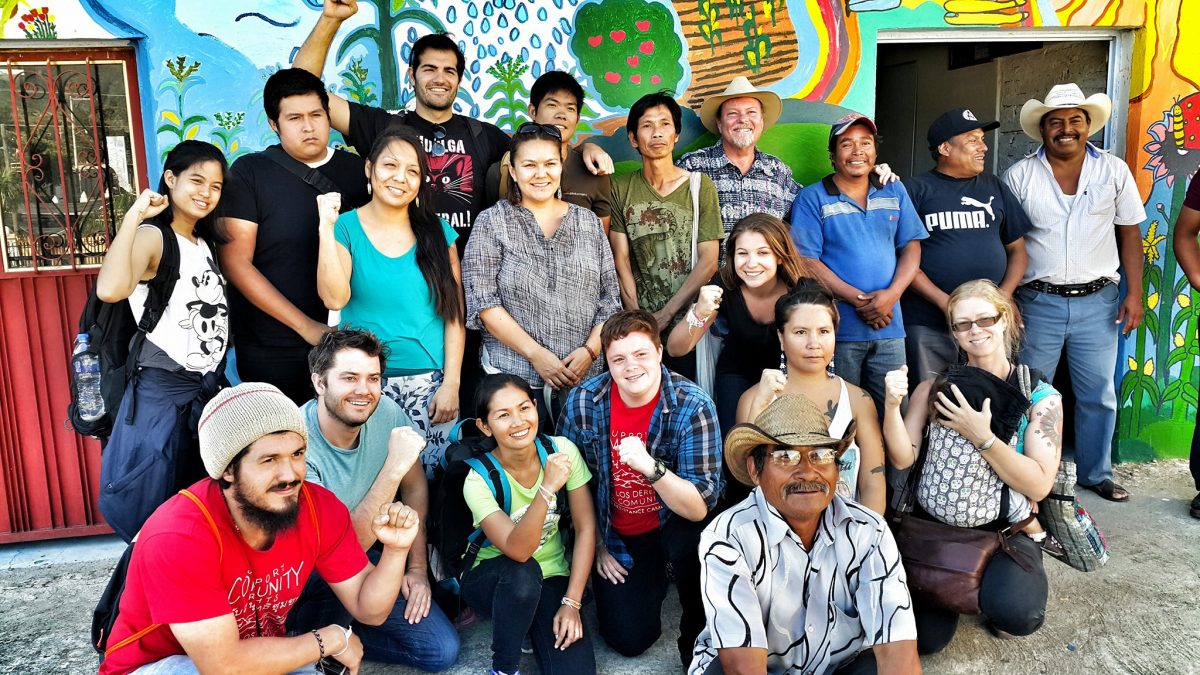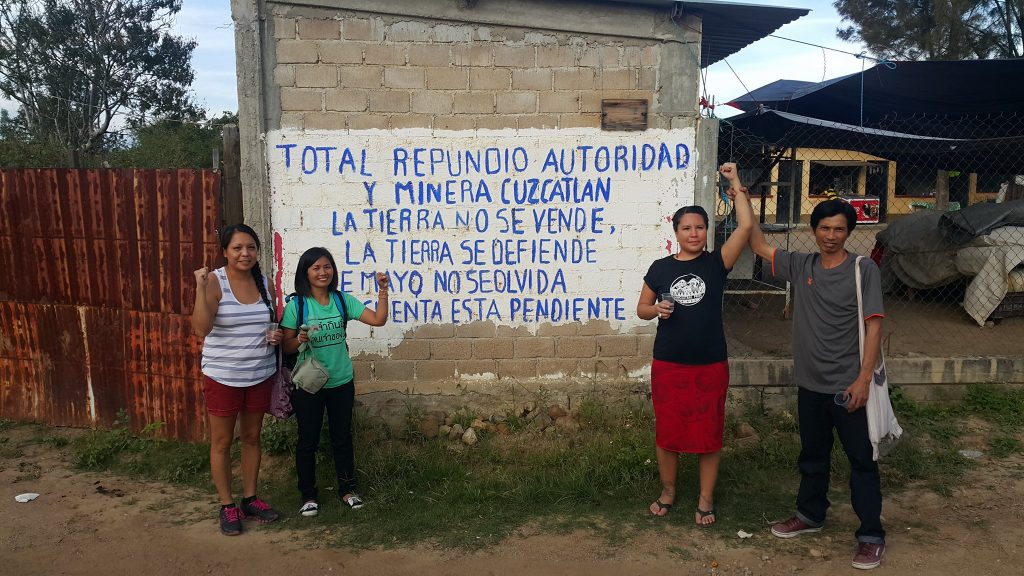A year after their return from Oaxaca, Mexico, two members of an anti-mining activist group in the Na Nong Bong village in Loei Province reflect on the lessons they learned from a two-week exchange with North American counterparts, all of which are facing similar struggles against mining operations within their communities.
Guest contribution by Andoni Almeida, Maria Bravo, Kevin Breslin, Michael Eckel, Zoe Kaufman, Talia Latch, McKenzie Maidl, Serena Manna

In 2015, four delegates from Isaan went to Oaxaca, Mexico to learn about indigenous peoples’ struggle against mining projects, some with centuries of history. This photograph was taken at Magdalena Teitipac, a Zapotec community threatened by a mining concession. Photo: John Mark Belardo
Last year in October, 44-year-old Surapan Rujichaiwat and 36-year-old Phattraporn Kaengjumpa departed on a trip to Oaxaca, Mexico, with the purpose of bringing Thailand’s anti-mining campaign to the international stage.
Surapan and Phattraporn belong to the anti-mining resistance group Khon Rak Ban Koed (People Who Love Their Hometown), met with several communities in Oaxaca, where they observed firsthand how indigenous communities struggle against mining, some having faced centuries of expropriation. The two-week trip also included cultural exchange activities such as cooking a traditional meal, attending día de muertos festivities, and experiencing a traditional temazcal sweat lodge.
Na Nong Bong’s anti-mining campaign went transnational fours years before through a Skype call to Floyd County, Kentucky, the United States of America, a community in the Appalachian mountains also suffering from mining operations like fracking. Until this conversation, the many years of fighting for secure property rights and autonomy in Na Nong Bong village had been contained to the area.
The Educational Network for Global and Grassroots Exchange (ENGAGE), a non-profit organization founded in 2001 by coalition of former study abroad students, organized the trip of the two Na Nong Bong representatives with the help of a local NGO in Mexico in order to build an international front against mining and in defense of water and land rights.
Both culturally and environmentally diverse, Oaxaca, Mexico, provides an ideal stage for the exchange on anti-globalization trends. Moreover, parts of Oaxaca are straddled by the mountains of southwestern Mexico, the birthplace of the Zapatista movement.
Originating in Chiapas, a state adjacent to Oaxaca, the Zapatista movement was sparked into action in 1994 by factors similar to those in Na Nong Bong. These include ecological crises, lack of available productive land, diminishing non-agricultural sources of income, and most importantly, a lack of autonomy from indigenous groups over their own land.
In the past two decades since the passage of the North American Free Trade Agreement (NAFTA) in 1994, Canadian mining companies have developed large scale mining projects throughout rural Oaxaca state. Although these projects often result in environmental destruction and the displacement of indigenous peoples, the Mexican government welcomes the foreign investment into these projects allowed through NAFTA, according to a media organization, Truth-Out.
Oaxaca’s mining dispute represents a familiar struggle between development projects and defense of the rights and needs of indigenous peoples.
Surapan thinks the situations in Mexico and Thailand are very similar, because in both, people are fighting to demand that governments uphold the rule of law and defend their rights. But Thailand’s situation is not yet as severe as Mexico’s, he said. Surapan stressed the difficulties communities in Mexico face when trying to rely on the law when such high private investments are at risk.
Agricultural livelihoods are at stake for villagers in both communities. If the mines continue operating in Oaxaca, the indigenous ways of life will likely have to change. They will have to find another source of income, uncontaminated water sources and alternative production methods. In Na Nong Bong village, water sources and soil are contaminated with heavy metals, making the food they grow unsafe to eat.

Na Nong Bong community leaders Suraphan “Mai” Rujichaiwat (right) and Phattraporn “Boi” Kaengjumpa (second from left), in San José del Progreso, southwestern Oaxaca. This community has faced violent retaliation to its defense of the environment and the community against the ongoing operations of the Fortuna Silver Cuzcatlán mine. Photo: John Mark Belardo
“The methods people use to fight are very similar,” Surapan says. Both communities rely on non-governmental organizations to provide support. The most significant difference Surapan noticed in their support systems was the role of teachers.
Teachers in Thailand rarely involve themselves in social movements because participation could jeopardize their careers as government employees. But Mexico’s teachers have a very strong civic engagement role in their fight, Surapan says.
“I can see from their eyes that they are more of fighters than we are,” he says. “They really apply their identity in the fight,” adds Phattraporn. In Thailand, villagers fight to protect their community. In Mexico, villagers are not only fighting to protect their community, but also the survival of their Zapotec heritage and their indigenous ways of life.
Phattraporn also communicates a sense of pride in both groups as strong women are on their front lines. Na Nong Bong calls those who lead their protests “Iron Women.”
Upon their return to Thailand, Phattraporn and Surapan were struck by the high expectations of their fellow villagers, who had hoped they would bring back tangible solutions and a pathway to resolve the conflict in their community.
While perhaps failing to meet the expectations of their peers, both community organizers say the trip gave them a better understanding of the bigger picture of grassroots organizations’ fight against the destruction and exploitation of large-scale mining projects.
Additionally, they returned with a more nuanced and self-critical understanding of the complexity of their struggle.
“If we have a sense of morality, our group has the potential to defeat the mine. But our own members use expensive electronics [exploiting minerals in their production], which goes against what we are fighting for. Maybe we need to start with our own leaders, and first get them to think a little deeper,” says Surapan.
Andoni Almeida, The University of Texas at Austin; Maria Bravo, Davidson College; Kevin Breslin, Davidson College; Michael Eckel, University of Puget Sound; Zoe Kaufman, University of Michigan-Ann Arbor; Talia Latch, Tulane University of Louisiana; McKenzie Maidl, Macalester College; Serena Manna, Johnson & Wales University. They are currently studying about development issues in northeastern Thailand.





